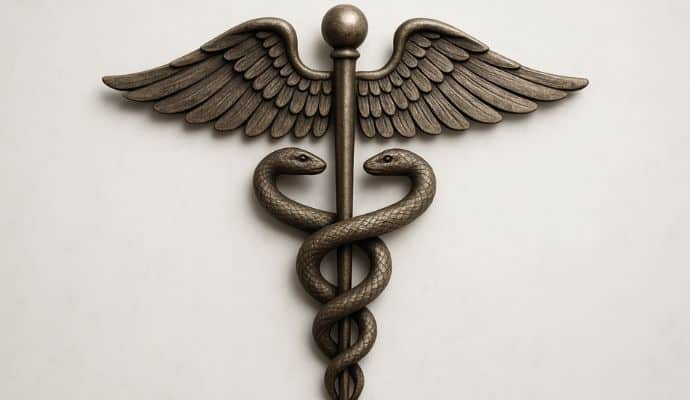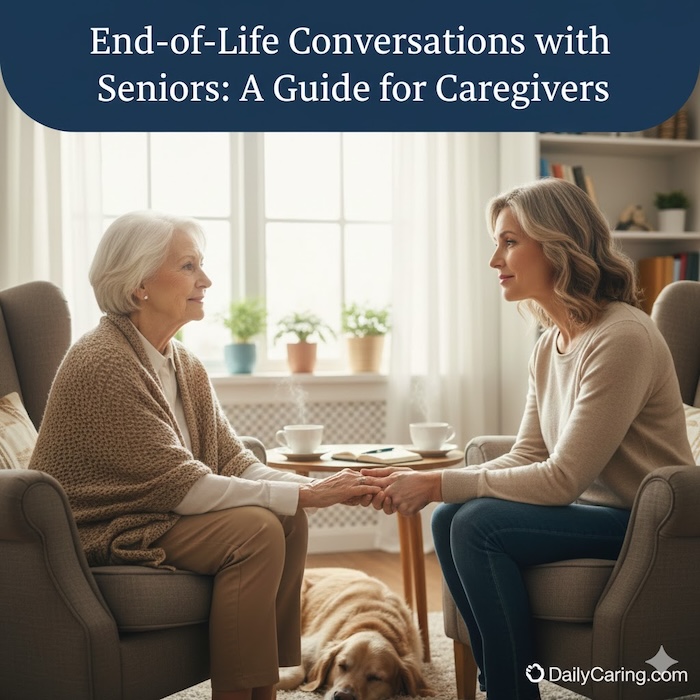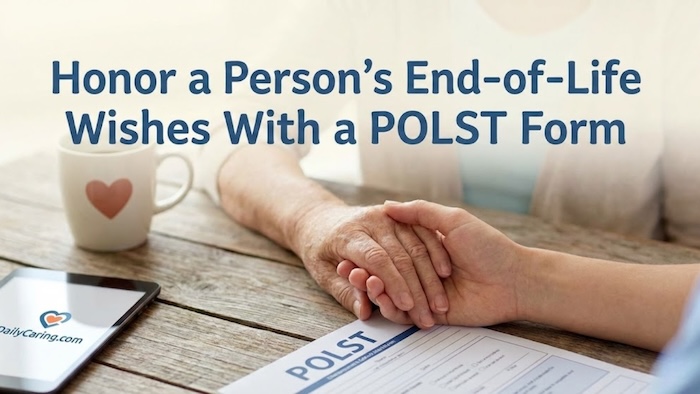When an elderly person experiences a medical emergency, families often assume CPR is the only option. But the reality of resuscitation for older adults is more complex, with outcomes that may not match what we see on TV.
In this piece, we break down what caregivers need to know about survival rates, quality-of-life considerations, and how to make informed decisions that align with your loved one’s wishes.

CPR for Seniors is a Controversial Topic
An important end-of-life consideration for seniors is whether or not they would want to have CPR if their heart stops beating or if they stop breathing.
What we usually see on TV paints a rosy picture of CPR, leading many of us to think everyone would want it. After all, the CPR shown on TV is quick, painless, and almost always works.
In real life, the CPR for seniors can be especially brutal, and survival rates are low.
Before making a choice about CPR, older adults must understand the risks, benefits, and chances of recovery.
We explain how CPR works, special risks for older adults, the chances of survival, and the quality of life after CPR.
How CPR Really Works
Cardiopulmonary resuscitation (CPR) is used as a treatment for sudden cardiac arrest. It’s much more violent than what’s shown on popular TV shows.
Real-life CPR means pushing down into the chest at least 2 inches deep and at least 100 times per minute.
Sometimes, air is forced into the lungs. Then, an electric shock is delivered to the heart to restart it.
If CPR is successful, all that pounding on the body usually results in significant physical trauma.
This trauma often includes broken ribs, lung bruising, damage to the airway and internal organs, and internal bleeding.
CPR Risks for Seniors
Along with the physical trauma, older people who receive CPR also have to deal with serious long-term consequences, such as possible brain damage from oxygen deprivation.
- Older bodies are physically weaker and less likely to recover from the CPR itself.
- The existing health conditions that caused heart failure in the first place make it even less likely that they’ll recover at all or have a reasonably good quality of life.
- Some people argue that using CPR on seniors leads to an unnecessarily prolonged and painful death.
For frail older adults with multiple chronic conditions, CPR survival rates are tragically low – often under 5%. Even when ‘successful,' many patients never return to their previous quality of life. – Dr. Jessica Nutik Zitter, ICU/Palliative Care Physician & author of Extreme Measures
CPR Survival Rates are Low Among Seniors
Research suggests that only 10-20% of all people who get CPR will survive and recover enough to leave the hospital.
For chronically ill elderly people, a study has shown a less than 5% chance of surviving long enough to leave the hospital after receiving CPR.
Another critical factor is the quality of life people will have after CPR.
Being well enough to leave the hospital doesn’t mean they will have the quality of life they desire.
Making a meaningful recovery from the cardiac arrest and the damage caused by CPR will be very difficult for seniors with existing health conditions.
Seniors Need to Know the Facts Before Deciding on CPR
This doesn’t mean that CPR isn’t a valid choice for your loved one.
It means they must understand the facts and realistic outcomes before making a decision.
In the study mentioned previously, when older adults over 85 years old were made aware of their chances of survival, only 6% chose to have CPR.
Talk To Your Physician About CPR Risks and Benefits
Your loved one (and you as their advocate) should ask their doctor about the risks, benefits, and their realistic quality of life after CPR before making a decision.
CPR is one of the few treatments that patients have to choose not to do – it’s part of the standard protocols used by hospitals and emergency responders.
If your loved one decides not to have CPR, they must have their doctor sign a DNR or POLST form. They can change their mind at any time and update the forms as needed.
Recommended for you:
- What is a DNR and Why Would Seniors Want One?
- Which End-of-Life Form Is Needed? POLST vs DNR
- 7 Tips for Helping Seniors at the Doctor: Being a Health Advocate
About the Author

Connie is the founder of DailyCaring.com and was a hands-on caregiver for her grandmother for 20 years. (Grandma made it to 101 years old!) She knows how challenging, overwhelming, and all-consuming caring for an older adult can be. She also understands the importance of support, especially in the form of practical solutions, valuable resources, and self-care tips.













Hi daily care.
I and my brothers have a big diction to make about C.P.R
We want mum to live but not to suffer. Our mum is in a care home with Alzheimer’s.
The doctor in the home has made the decision for us to do not resuscitate which I feel it’s wrong since my brother’s are the one who has the say on what they want for mum.
I just feel that we still want mum hear and for the doctor to make that decision for us has made me feel that I want my mum to live a little bit longer. It’s not up to him it’s up to us. So upset about this.
The person who holds the Healthcare Power of Attorney is the one who has the legal right to make this decision. You may want to speak with the care home’s administrator since the doctor isn’t honoring your mother and your families wishes for end-of-life care. The doctor can make a recommendation, but the decision is up to the person who holds the Power of Attorney, typically a family member.
Thank you for the informative article on CPR. The negative effects on elderly persons should be more widely publicized & known, as the common assumption is that CPR is great for everyone.
You’re very welcome, so glad this article is helpful! Whether or not to have CPR is an important decision, so it’s essential to have all the facts.
My Dads heart stopped he had cpr he is 83 and i am so sad to see him suffering. With a tube down his throat for oxygen
We’re so sorry to hear about your Dad’s heath emergency 💔
This is a very hard decision to make. My mom is 101 years of ages, but her health is not that great, congestive heart failure, kidney failure and Alzheimer. She is very frail and weak. I have told the medical field to go ahead with the CPR but now I am not sure. So confused at this moment.
We can certainly understand how tough a decision this is. It’s a very personal choice, based on what you think your mom would want. Whatever the outcome, you’re making the best choice you can in a difficult situation.
I had to make this decision with my mother tonight. The physician had stated all the above cons to having this done. My mother is 80 and very frail. I wasn’t sure if mother and I made the right decision to not have CPR done. I had the weight of the work on me until I read the comments. I feel at ease now knowing what he said was true. If her heart stops I am now at peace knowing she will go with peace and not a horrific end that with all the trauma. Thank you everyone for sharing. I feel better about the decision knowing in my soul , I made the best for her and a hopefully painless end .
Thank you for sharing your and your mother’s story with us ❤️ This is such a difficult and personal decision to make. We’re so glad that this article and reader comments were able to provide a little peace.
I had CPR when I was found on the floor, not breathing and no pulse. I woke up in ICU where I remained for almost a month. From there I was put in a few nursing homes. I’m out now and looking liv ng in an assisted lving facility. I have to use a walker as my muscles are weak. Given the atroscious , often abusive treatment in the nursing home. And my inability to walk, I think had I been given the option, I would have refused CPR. No one loves loves life and fears death more than me, but there is no quality of life any longer. I am more or less at the mercy of uncaring strangers.
Thank you for sharing your story. I’m so sorry that all this has happened 🙁 It sounds like you’re continuing to recover, so even though it’s a slow process, hopefully in time you’ll regain more strength.
My experience is that vast odds with this article. My heart stopped and I had CPR. It was in no way traumatic, I was in no way badly affected and I’m very grateful for the intervention. I am 66 and I would want that type of intervention for my mother who is now 94.
So glad that you’re well and that the CPR didn’t do significant damage. Every person’s health and physical condition is different and the emergency situation will also be unique, so the outcomes would be difficult to predict.
The only thing we can all do is understand the possible and likely outcomes, our own health situation, and our personal wishes. Having the facts helps each person make an informed decision.
This last Friday night my mom, age 84 was transported to the hospital from her assisted living facility because of low blood pressure. While in the ER she arrested. Mom has a DNR order but the doctor didn’t know that when he started. Mom is now on a ventilator and being pumped full of drugs to help with pain and infection. She has multiple broken ribs. She already had a severe back injury stat caused her to be wheelchair bound. I feel angry that she is still alive(if that’s what you call it). She has been in pain for so long and just wants to rest. I feel so badly for her.
We’re so sorry that happened to your mom 🙁 It’s terrible that they didn’t know that she had the DNR.
I am 79 and a survivor of Code Blue. I had sepsis, pneumonia, a lung drain tube and other lung operation, heart failure and a fib.
I had CPR and it is what this article says..fractured rib and internal bruising…I was hospitalized for 60 days. I am happy to say, I have almost regained and resumed my life as it was before because I have the support of family and countless friends and good care.
I do think it makes a difference of your physical condition when you receive CPR. If you are in good health, the outcome can be favorable.
Wow, congrats on an amazing recovery! We’re so glad to hear that you’re doing well and able to get back to life as it was. It’s also wonderful that you’ve had such great support from family and friends, that can make such a huge difference. Thanks for sharing your story.
I appreciate this article. As a nurse with many years experience, I can attest to the fact that CPR is very hard on the elderly and frequently results in broken ribs and damage to lungs. I try very hard to talk to all my patients about the importance of making end of life decisions in advance.
It’s wonderful that you’re sharing you knowledge with the families you work with! This is such an important topic and greater knowledge about the consequences of CPR could prevent unnecessary suffering for older adults.